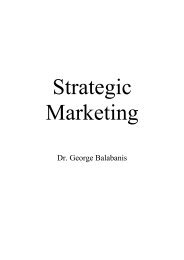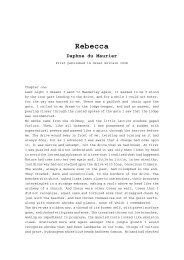Brand Failures
Brand Failures
Brand Failures
You also want an ePaper? Increase the reach of your titles
YUMPU automatically turns print PDFs into web optimized ePapers that Google loves.
76 <strong>Brand</strong> failures<br />
Then there are the examples of successful brand extensions that encourage<br />
other brands to follow suit. Of these, Virgin is the most obvious. ‘<strong>Brand</strong>s are<br />
built around reputation, not products,’ says Richard Branson. Yet even Virgin<br />
has proved considerably more successful in some categories than others.<br />
Virgin Cola, for instance, proved a complete flop. Furthermore, Virgin has<br />
built its reputation as the consumer’s champion, entering significantly<br />
different markets (bridal wear and pensions, for example) without diluting<br />
its identity. The consumers’ perception of Virgin is also unified by the<br />
charismatic figure of Richard Branson himself. Think Virgin, and it’s not too<br />
long before you think of Branson. So while the Virgin product and service<br />
offerings broaden year by year, the brand identity remains coherent.<br />
Most other brands, however, do not have such versatility. For instance,<br />
Volvo has built up its reputation around the notion of ‘safety’. If it was<br />
suddenly to launch a car without airbags, it would contradict its established<br />
brand identity.<br />
And yet, despite the danger involved, brand extensions are everywhere.<br />
Nine out of ten new grocery products are line extensions. Think also of the<br />
beer market. US beer drinkers 25 years ago had a choice of three major brands<br />
– Miller, Coors and Budweiser. Today there are over 30 varieties of these same<br />
brands, yet the number of beer drinkers remains roughly the same.<br />
Having said that, most of the brands which boast successful extensions have<br />
moved into related categories. Coca-Cola had a global hit when it launched<br />
Diet Coke. It was less successful however when it introduced its own range<br />
of clothing. Gillette is often celebrated as a great ‘how to’ model for brand<br />
extension. It moved smoothly from selling razors to selling shaving cream.<br />
With such compatible products the success of one product feeds the success<br />
of the other, and the brand as a whole feels the benefit.<br />
Often however, extensions have been made by companies with no apparent<br />
understanding of what their brand is about. Many believe they can have their<br />
cake and eat it, that having built a strong brand perception based around one<br />
product category, they can transfer it to unrelated products and increase sales<br />
on the back of the same brand name. Other companies that may have a better<br />
understanding of their brand identity may still weaken their brand assets by<br />
launching products so similar that they cannibalize their original market. As<br />
the examples over the next few pages serve to illustrate, both approaches result<br />
in failure.










